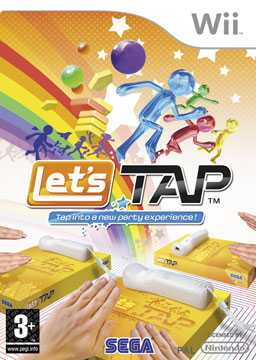Let's Tap
| Let's Tap | |
|---|---|
 | |
| Developer(s) | Prope |
| Publisher(s) | Sega |
| Director(s) | Shunsuke Kawarazuka Tetsuo Shinyu |
| Producer(s) | Yuji Naka Hiroyuki Miyazaki |
| Artist(s) | Hiroyuki Yamamoto |
| Composer(s) | Ayako Saso Naofumi Hataya Shinji Hosoe Azusa Chiba Masaharu Iwata Mitsuhiro Kaneda Noriyuki Kamikura |
| Platform(s) | Wii, iOS |
| Release date(s) | |
| Genre(s) | Rhythm, Minigames |
| Mode(s) | Single player, multiplayer |
| Distribution | Wii Optical Disc, Download |
Let's Tap is a video game developed by Yuji Naka's studio Prope and published by Sega for the Wii console. Along with Let's Catch, Let's Tap was the first game from Prope to be announced. Owners of Let's Tap will be able to unlock content in Let's Catch.[1] The game was later released as five individual applications for the iOS.[2]
Gameplay
Let's Tap consists of a number of minigames that requires the player to tap a flat surface with their hands to play. The game requires the player to set the Wii Remote face-side down on a flat, stable surface, with the accelerometer picking up their vibrations as they tap the surface to move an on screen character in a race, inflate a balloon, create ripples in a pool of water or paint swirls on a canvas.[3]
In a video released by Sega the player is shown resting the Wii Remote on an empty box originally used to package the Wii console.[4] In Japan and Europe Sega has released the game with two foldout cardboard boxes that players are able to use as a tapping surface.[5] However these are not included in the North American package.[6]
Minigames
The game features the following minigames:
- Tap Runner: Up to four players compete in a side scrolling race along an obstacle course where they must jump over chasms, climb up ramps and edge along tightropes, in addition to completing mini challenges such as inflating a balloon the fastest. The game is controlled with the speed of taps, with rhythmic tapping making the player jog, faster taps to run and a hard tap to jump.[3]
- Rhythm Tap: Players tap in time to a moving timeline of musical beats.[3]
- Silent Blocks: Players must pull away blocks that make up an unstable tower by carefully tapping. A puzzle mode variation sees players making stacks of three or more matching colored blocks in order to make them disappear.[7]
- Bubble Voyager: Players control a character through a maze of floating mines, collecting stars along the way. The minigame also features a multiplayer battle mode for up to four players.[7]
- Visualizer: A freeform mode where players use taps to create imagery such as fireworks bursting over a futuristic cityscape, paint splattering on a canvas, and ripples of water across a pond.[3]
Reception
| Reception | ||||||||||||||||||||||||||||||||||||||||||||||||||||||||||||||||||||||||||||||||||||||||
|---|---|---|---|---|---|---|---|---|---|---|---|---|---|---|---|---|---|---|---|---|---|---|---|---|---|---|---|---|---|---|---|---|---|---|---|---|---|---|---|---|---|---|---|---|---|---|---|---|---|---|---|---|---|---|---|---|---|---|---|---|---|---|---|---|---|---|---|---|---|---|---|---|---|---|---|---|---|---|---|---|---|---|---|---|---|---|---|---|
| ||||||||||||||||||||||||||||||||||||||||||||||||||||||||||||||||||||||||||||||||||||||||
Let's Tap has received generally favorable reviews from critics, garnering a Metascore of 70 at Metacritic.[9]
Eurogamer praised the innovative control method and the well-designed minigames, calling it "one of the few worthwhile and interesting mini-game compilations in existence".[10] N-Europe called it "very original and conceptually ambitious", praising its accessible control scheme and multiplayer modes.[11]
References
- ↑ Nintendo Download: Toasters, Rainbows, Catching, Calculators, Clocks and Harriers (US)
- ↑ http://kotaku.com/5363877/lets-tap-your-iphone
- ↑ 3.0 3.1 3.2 3.3 TGS 2008: Let's Tap Hands-on
- ↑ Let's Tap Japanese Debut Trailer
- ↑ Let’s Tap boxart doubles as official tapping surface
- ↑ What Do I Tap On, Sega?
- ↑ 7.0 7.1 Let's Tap gameplay overview trailer
- ↑ "Let's TAP". GameRankings. Retrieved 2011-07-06.
- ↑ 9.0 9.1 "Let's TAP". Metacritic. Retrieved 2011-09-30.
- ↑ Eurogamer Let's Tap Review
- ↑ N-Europe: Wii Review: Let's Tap
External links
- Let's Tap official website (Japanese)
- Let's Tap at IGN
- Let's Tap at Giant Bomb